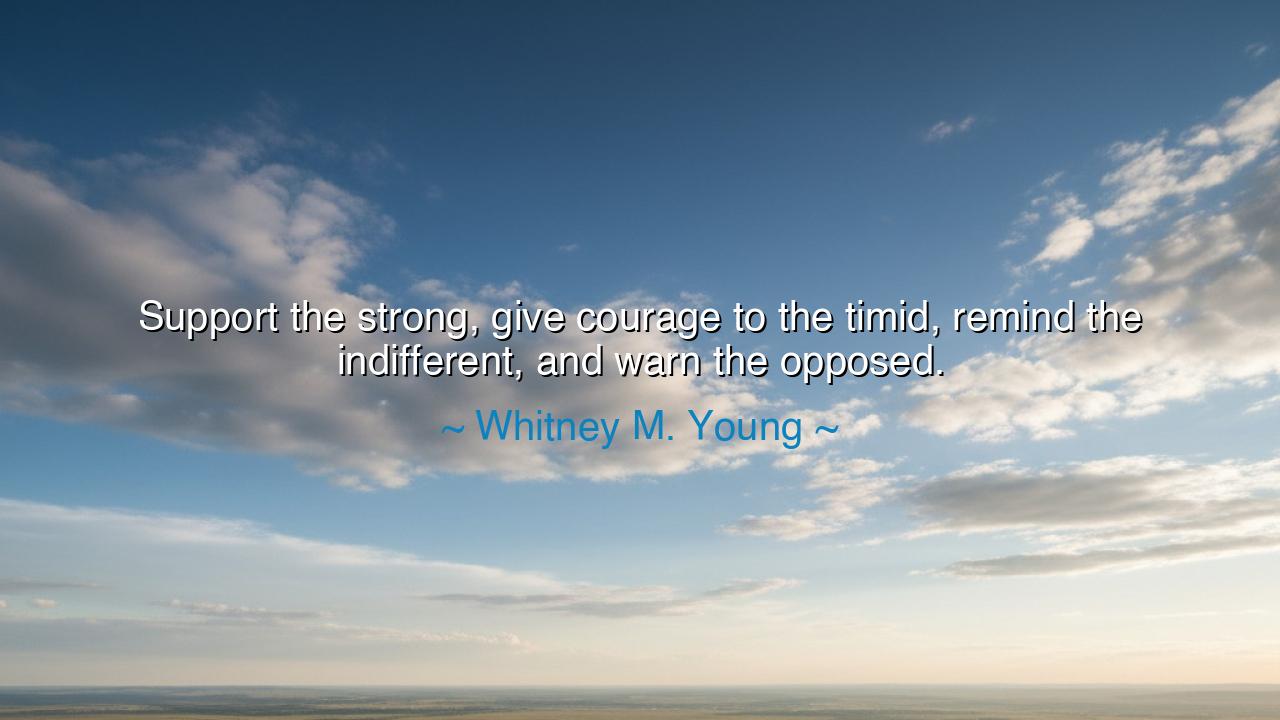
Support the strong, give courage to the timid, remind the
Support the strong, give courage to the timid, remind the indifferent, and warn the opposed.






“Support the strong, give courage to the timid, remind the indifferent, and warn the opposed.” Thus spoke Whitney M. Young, the great civil rights leader and tireless advocate for justice and equality. In this single sentence, he revealed the blueprint for moral leadership and the sacred duty of those who would guide humanity toward a more righteous path. His words, though simple, carry the weight of eternal wisdom: that the struggle for progress requires a balance of strength and compassion, of guidance and courage, of vision and warning. They speak not only to leaders and reformers, but to every soul who would seek to build a world of harmony and understanding.
Born into the heart of segregation, Whitney M. Young Jr. rose to become one of the most influential voices of the American civil rights movement. As the head of the National Urban League, he did not march with fiery rhetoric alone—he built bridges, he negotiated, he healed divisions between the powerful and the oppressed. His method was neither of anger nor appeasement, but of human understanding. When he uttered these words, he was describing the art of leadership in its truest form: to know that not all hearts move at the same pace toward justice, and that each must be reached in the way they can best hear.
To support the strong is to recognize those who labor on the front lines of righteousness—those who bear the burden of progress and carry the light when others falter. The strong do not need pity, but they need reassurance, for even pillars can tremble under the weight of great purpose. It is the duty of the wise to uphold them, to strengthen their resolve, to remind them that they do not fight alone. The general who stands at the front of the army, the teacher who speaks truth in the face of ignorance, the parent who raises children in hope amid hardship—all these must be supported, lest they grow weary and fall.
To give courage to the timid is to awaken the dormant power within those who doubt their own worth. The timid are not cowards—they are those whose hearts are burdened by fear, whose voices tremble before the call of duty. Yet within them lies the potential for greatness. History is full of such transformations. Think of Rosa Parks, a quiet seamstress who one day refused to give up her seat, igniting a revolution. Her courage did not come from noise or anger, but from quiet conviction. Somewhere, someone gave her the strength to believe that her small act could change the world. This is the essence of Young’s teaching: that to encourage the timid is to unlock the hidden bravery of humanity.
To remind the indifferent is perhaps the hardest task of all. Indifference is the poison that numbs the conscience, the cold fog that smothers the flame of compassion. The indifferent are not evil, but asleep; they look upon injustice and say, “It does not concern me.” To awaken them requires patience, empathy, and persistence. The prophets of every age have cried out to stir the hearts of the complacent. Martin Luther King Jr. once warned that “the greatest tragedy is not the strident clamor of the bad people, but the appalling silence of the good people.” Young, in his wisdom, knew that movements are not built only by the passionate few—they require the awakening of the sleeping many.
And finally, to warn the opposed is to speak truth to those who resist righteousness—not in hatred, but in firmness. The opposed are not always enemies, but those who stand in the darkness of ignorance, fear, or pride. To warn them is an act of moral duty—to let them know that every injustice carries a cost, every cruelty a consequence. Yet such warning must come not with vengeance, but with justice. The aim is not to destroy, but to transform. Like a prophet at the city gates, Young’s words remind us that courage must walk hand in hand with compassion, and truth must never abandon mercy.
In these four commands—support, give courage, remind, and warn—Whitney Young offers a complete vision of leadership, applicable to every age and every heart. He shows us that progress is not the work of one kind of person, but of many: the strong who lead, the timid who rise, the indifferent who awaken, and even the opposed who must face the light of truth. Each soul must be met where it stands, and each must be moved toward the greater good.
Therefore, let this be the teaching for those who would live wisely and act bravely: be the strength of others. When you meet the strong, lift them higher. When you meet the timid, speak to their courage. When you meet the indifferent, stir their hearts with compassion. And when you meet the opposed, stand firm, yet offer the light of understanding. For in doing so, you walk the path of Whitney M. Young, who showed that the truest form of courage is not only to fight for oneself, but to lift others into the fight with you. This is how nations are healed, how hearts are awakened, and how justice endures—through the eternal balance of strength, compassion, and wisdom.






AAdministratorAdministrator
Welcome, honored guests. Please leave a comment, we will respond soon